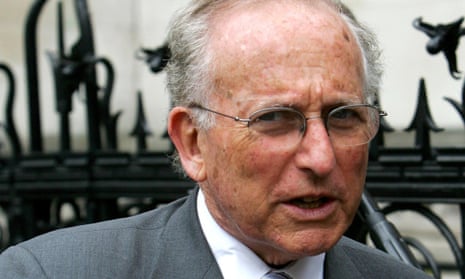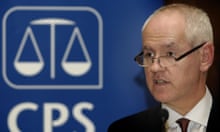A controversial decision by the Crown Prosecution Service not to prosecute Lord Janner of Braunstone over alleged historical child sex crimes is being reviewed, a spokesman has said.
Despite there being enough evidence to prosecute the 86-year-old Labour peer for 22 sex offences, the director of public prosecutions, Alison Saunders, said last month he was too ill with dementia to stand trial.
An unnamed QC has been asked to re-examine the case, a CPS spokesman said on Friday. The move could overturn the block on court action.
Saunders came under pressure to allow an independent review after
Janner’s alleged victims demanded it and Leicestershire police, which had investigated claims against the peer, said they were considering a legal challenge.
In a statement, the CPS spokesperson confirmed that the QC who has had “no previous involvement with the decision” is carrying out the review.
The barrister will decide whether Saunders was right to rule that it would not be in the public interest to charge the former Labour MP. Saunders has insisted that her decision was justified because Janner is too ill to stand trial and because there are no sanctions that could be imposed on him following a prosecution.
But if the QC decides that her assessment was wrong, the DPP’s decision will be reversed and the peer would face charges for alleged sex crimes committed over several decades.
Such reviews are normally carried out internally, but the CPS said the exceptional circumstances of the Janner case had led it to hire a senior QC from outside the organisation. CPS guidelines say that such reviews should normally take about 30 days, but that longer could be required in more complex cases.
Simon Danczuk, the Labour MP who has called for Saunders to consider her position over the decision, said the review prompts new questions which must be answered.
“I welcome this but I am worried that the CPS is commissioning a review after they have frankly got this whole episode wrong from the very beginning,” he said. “I hope it is entirely independent of previous decisions by Saunders.
“She sat on the police file for nine months before announcing a muddleheaded decision when parliament was not sitting and is now announcing this just as MPs prepare to come back. I hope we are not seeing political manipulation with a small P.”
Janner was accused of a catalogue of abuse against young boys, and more than a dozen people came forward to claim he abused them during the 1960s, 1970s and 1980s. His family have always strenuously denied the allegations.
Slater and Gordon, which is representing a number of Janner’s alleged victims, asked the CPS to commission an independent review of its decision to not charge the peer with any offences on the grounds that he is too ill with Alzheimer’s disease to stand trial.
At least 10 men with dementia have been convicted of child sex offences since 2010, including six in the past year.
If a person’s mental state is a consideration, then their fitness to plead can be tried. If they are found unfit to plead, then the facts of the case are tried rather than the person, so the accused receives neither the same verdict nor the same sentence as an ordinary defendant.
The QC will also be asked to examine evidence that Janner is unfit to face trail. Four doctors, two appointed by the CPS and two by his family’s solicitors, were asked to give their own assessment of his condition.
Shortly after the decision not to prosecute, the Guardian was given a letter sent to the clerk of the parliaments which had been apparently signed by Janner just days earlier.
Saunders has come under considerable political pressure to allow the review.
In a letter to the Times, a cross-party group of MPs said the decision was damaging public confidence, while the then deputy prime minister, Nick Clegg, expressed sympathy with calls for a review.
Lord Falconer, a former lord chancellor, said Saunders was wrong, and suggested there should have been an open hearing before a jury to decide whether Janner was fit to enter a plea.
Former DPP Ken Macdonald added to the pressure by saying that if a judge had decided whether to continue with the prosecution, there would have been “no doubt” that the allegations had been handled properly.
Some have defended Saunders’ decision. “He is unable to defend himself. No criminal trial could possibly be fair in such circumstances. Any judge would inevitably stop the proceedings as an abuse of process,” said David Pannick QC, who helped Nicholas Purnell QC and lawyer Jae Carwardine in making representations to the DPP that Janner should not be prosecuted because of his mental state.
The peer was first accused of abuse offences in 1991 by a witness at the trial of Frank Beck, a serial abuser who ran children’s homes in Leicestershire. Janner’s only police interview took place that year at a police station in Leicester. He attended with his solicitor and gave “no comment” answers. The CPS decided at the time that there was no evidence to warrant charging him.
Janner told parliament that the claims against him consisted of “disgraceful, contemptible and totally untrue allegations”. But despite his name being temporarily cleared – and his being given a peerage in 1997 – further allegations were investigated by Leicestershire police in 2002. The information was not, however, passed to prosecutors to consider.
Four years later, another alleged victim came forward with claims against three individuals, including Janner, but again prosecutors decided there was insufficient evidence to prosecute.
The CPS has admitted it made mistakes and that Janner should have been prosecuted earlier when his health was better. “In relation to the other three previous investigations, the CPS also now considers that the evidential test was passed. It follows that mistakes were made in the decision making at the time by both the Leicestershire police in 2002 and the CPS in 1991 and 2007. Lord Janner should have been prosecuted.”
Saunders said Janner would have been charged with 22 sex offences against children if he had been fit to stand. He would have been charged with 14 indecent assaults on a male under 16 between 1969 and 1988; two indecent assaults between 1984 and 1988; four counts of buggery of a male under 16 between 1972 and 1987; and two counts of buggery between 1977 and 1988.
Janner’s family said last month that he was entirely innocent of any wrongdoing.
“As the Crown Prosecution Service indicated today, this decision does
not mean or imply that any of the allegations that have been made are
established or that Lord Janner is guilty of any offence,” a statement said.







